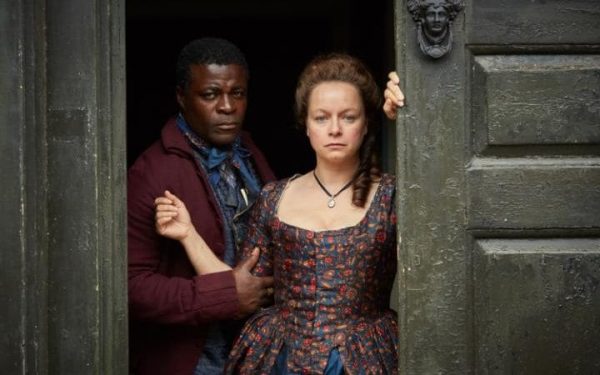
Harlots is a new drama on Hulu following the misadventures and rivalries of two competing brothels in mid-18th century London. Created by Moira Buffini and Allison Newman, and loosely based on research by Hallie Rubenhold, Harlots isn’t only notable for being about harlots—all the writers and directors are women also, which allows for a truly unprecedented lack of the male gaze and titillation shots, and instead creates room for the characters to be fully-fleshed people. History geek Tits and Sass contributors Kitty Stryker and Red discuss the first episodes and what sex worker life was like in the Georgian England setting of the show.
On historical context:
Kitty: The one in five women are sex workers at the time statistic, cited in the beginning of the show, is a high estimate, but it is quoted a lot, and may not be incorrect. The number appears to come from historian Dan Cruickshank in his book, The Secret History Of Georgian London: How The Wages Of Sin Shaped The Capital. He is also where the number of of £1.5 billion in today’s money as the gross turnover of sex work funds at the time comes from.
Red: Capitalism and a market economy were just starting to take over and the situation of women was changing, as the public sphere became the exclusive province of men in England. At the same time, capitalism was pushing the growth of a relatively new genre: porn! Much of the earliest porn consists of dialogues between whores or a whore recounting her exploits (a la Fanny Hill).
While the one in five stat is high, women dipped in and out of sex work as necessary, and the word whore didn’t exclusively mean a professional until later on in the century.
Kitty: It’s also worth noting that while sex work was prominent, “bawds,” or madams, were deeply loathed by London society—one famous bawd was stoned to death for her part in “corrupting the innocent.” Now, to be fair, many bawds did go around looking for naive farm girls to offer free housing to, only to then trap them with false debt for the lodgings and food they used. But this is also definitely where the hatred of pimps strongly developed.
Covent Garden was the place for sex workers at the time! Golden Square, also referenced in the show, incidentally, went from being a place for wealthy up-and-coming sex workers to a place for dire poverty—it becomes the epicenter of the cholera epidemic that wiped out a lot of London in 1854.
On Harris’ List, an anonymous book of commentary on Covent Garden prostitutes, a kind of antecedent to today’s board escort reviews—the show opens with Lucy (Eloise Smyth) reading each brothel worker’s entry aloud to her:
Kitty: The history of Harris’s List is actually super interesting and this was a good book on it—Covent Garden Ladies by Hallie Rubenhold, the book this show is actually loosely based on. You can read the list here for free, by the way!
Red: Charlotte (Jessica Brown Findlay) is based on a real woman Rubenhold wrote about, and so is her mother—Elizabeth Ward, Samantha Morton’s character. They changed the last name to Wells in the show, and her first name to Margaret. The real Charlotte changed her last name to Hayes after she got her first rich protector and left her mother’s brothel.
Interesting note: Some of the women who paid Harris to write good reviews of them in his list formed a “Whores’ Club” where they met and drank together and paid dues, and any of the club members who needed help got some of the dues.
On the contract Charlotte’s thinking about signing with her benefactor and how it compared to marriage at the time:
These contracts were common among famous, sought-after sex workers. Some had two or more going at a time sometimes! Many times these contracts were oral contracts, and would stipulate how much the kept woman would get per month in cash and gifts, if she would be given an apartment or not, if her bills would be paid, new clothing, etc.
Because what she gave in exchange was often just “understood,” it left a lot of wiggle room for her. Often, when such a contract was broken and the arrangement was declared over, she could also negotiate for annuities, perhaps in exchange for keeping his secrets.
One attractive thing about having such a contract is that the person paying often paid to the bawd who “owned” the sex worker in question. In order for the sex worker to be “released” to the status of kept woman, the buyer would have to pay off all debts the sex worker had accrued according to the bawd. Becoming a kept woman could mean less risk of syphilis, which was a disfiguring death sentence at the time, and also could mean when the arrangement ended, you were free to do what you wanted as you weren’t indebted to a house anymore.
I think it’s interesting that while Margaret obviously feels a lot of resentment for being sold to Lydia Quigley (Lesley Manville) when she was 10 (a sadly pretty common occurrence at the time—the youngest on record was eight, and people believed having sex with a child would cure you of STIs), and Charlotte’s virginity was auctioned off at the age of consent (which was 12 for girls, 14 for boys at the time), Lucy appears to be at least 18 and is still “not ready.” I wonder if Charlotte is upset that her mother got her into sex work, or that she’s upset that despite her mother’s distaste for marriage, here she is being roped into a different but similar contract with Sir George Howard (Hugh Skinner).
Red: My main thoughts on watching were how laughably anachronistic both Charlotte and Lucy ‘s (a fictional character made up for the show) unwillingness to participate in such a huge money generating activity is. The contract that Charlotte turns her nose up at wouldn’t have given him anything close to coverture over her. Instead, it would have offered her either carte blanche over his money or a specific amount of credit to use when shopping. It couldn’t have prevented her from having other lovers; he would have to rely on her discretion. The idea that someone raised in the poverty of Covent Garden would turn up her nose at that and just want to fuck for money without it is so hilarious to me. This was the ultimate goal of whores in the 18th century, because it was a step up to a security just below that of marriage (which also could and did happen between contemporary sex workers and their clients).
My guess is that Charlotte’s reluctance comes from the producers thinking they need some sort of 21st century young woman angst in order to make these characters relatable.
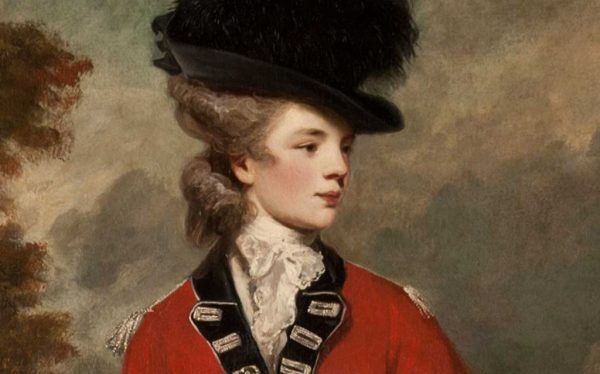
Kitty: I agree that Charlotte and Lucy’s ambivalence about being sex workers seems really odd. I will say, though, that there are accounts of having a contract with a client and then falling out of favor with him having dire consequences for sex workers—many of the famous courtesans with arrangements like that at the time ended up dying poor partly because of that.
Red: Lady Worsley was a woman whom Rubenhold also wrote about. Worsley’s husband wanted to watch her have sex with other men but refused to divorce her when she tried to leave him. This situation threw her into the demi-monde, which is what happened to women who couldn’t get divorces from their husbands.
So what Lady Worsley ended up doing was having all of the men he’d required her to fuck testify that she’d been unfaithful.
By the time she finally got her divorce, she had been stuck whoring for survival too, and her original lover had left her. Her plight drives home the fact that the contract Charlotte is balking at was nothing like a marriage contract and never could be. Charlotte’s actual lover around the time of the show was a man who beat his wife into giving up her money, so that he could use it to pay Charlotte. Whores might not have much power, but at least they weren’t wives.
Money is the only real kind of power, and therefore, freedom in this world, as Margaret notes. I think the show is already doing well with that theme! If it keeps touching on how badly wives were treated (Margaret also comments that she wouldn’t wish marriage on a dog), instead of focusing exclusively on Charlotte’s whiny dismissal of her contract, it will be perfect.
On Margaret Wells as management and the auction for her daughter Lucy’s virginity:
Kitty: While I might be alone in this, I appreciated that Margaret seems to feel some weight to her decision to sell Lucy’s virginity, even while being deeply pragmatic about it. Perhaps it’s because I have some context in the form of Nikki Blue, who had a “deflowering party” at Kink.com that went badly a few years back. The tension between doing something that is practical for your career and survival even as you have mixed feelings about it, and the requirement for your clients and the world at large that you seem cheerful about it, is super real.
Red: I would slap Margaret’s daughters if I were her, to be honest! You can die in the gutter or in prison like THAT and the little bitches are striving after true love, 21st century style?
As far as Emily Lacey (Holli Dempsey) goes—I couldn’t get what her specific complaints against Margaret were, but the favoritism shown to Margaret’s daughters, while pardonable, would have been at the literal expense of women like Emily Lacey; they’re literally supporting Lucy’s delayed entry onto the town on their knees and on their backs and that’s got to burn at times. I don’t know if it’s possible to ethically profit off others’ sexual labor, but I’m positive that the real Elizabeth Ward (whom, again, Margaret Wells is based on) wasn’t running her business like that. I see the bawd as akin to a landlord—her interests are diametrically opposed to the women renting clothes or space from her, and what’s the sense in being in an illicit trade if you aren’t going to make the most of it?
On syphilis, “the French pox,” which ex-Quigley brothel worker Mary Cooper (Amy Dawson) is shown dying from in the second episode:
Kitty: Syphilis was a pretty widespread disease—beauty marks were en vogue in part because they covered up syphilitic marks on the face, which was a telltale sign of having “the pox.” Wigs were used to hide hair loss, which was also a sign of syphilis. At the same time, I believe there was even a law preventing women from using makeup to make themselves look too much better than they did naturally—it was deemed to be a method of tricking men into marriage (which has parallels to men now complaining about women wearing too much makeup). Harris’s List warns clients against certain women because the author thought they had the disease. Lambskin condoms were available, but few people used them…Even those who did tended to wash them and re-use them, thus making their use reasonably irrelevant in terms of disease prevention.
Mercury was used to combat syphilis (as a salve, a pill, or a steam), but the symptoms of mercury poisoning were also horrible —tooth loss, ulcers, and neurological damage. Both syphilis and mercury would kill you painfully over time.
Red: Men weren’t safe from it either, even rich men. John Wilmot is a famous example of someone who literally rotted from syph. Unless a sex worker had managed to save money or had family who were understanding, pain and poverty were sort of inevitable after infection.
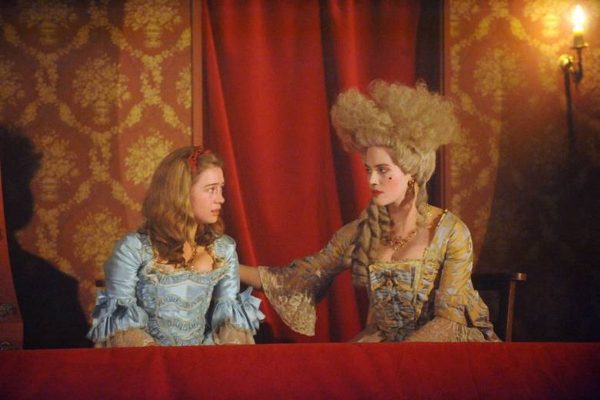
On how the show seems to have a better grasp of the racial diversity of this period in England than many historical dramas do:
Kitty: The racial diversity is fantastic and definitely realistic. I’m glad for it, and glad that William North (Danny Sapani) and Margaret are shown to have a relationship and a child together, as Nathaniel and Harriet Lennox (Con O’Neill and Pippa Bennett-Warner) are, too. That said, racism was still certainly alive and well in Georgian London and I wonder how much that will be addressed—you hear it briefly when Quigley says “you’ll work like a black” before locking Emily into her cage at Quigley’s brothel, and when Lennox’s son (Douggie McMeekin) mouths off to his colonialist father about his marrying a black woman, but I’m curious if there’ll be much more mention than that. (Also see: Belle.)
On gambling and Charlotte’s gaming debts:
Red: Gambling ruined basically everyone in the 18th century, and it was the cool pastime for dashing men and women both (until the turn of the century, when it began to be male only). The 1760s are the beginning of the last hurrah for England’s landed wealthy—the middle class is coming up from behind, people want the franchise, the States are about to leave, slavery’s ending in less than a century, and in a little over 100 years comes the transfer of exclusive power from the titled families to the nouveau riche because peers just can’t afford their ancestral homes or anything anymore. So in that light, it’s kind of funny to me that gambling away your family’s whole fortune or letting your lover do it for you was such a stylish thing to do.
Charlotte should certainly know better, but as a young person being paid to be socially attractive, it’s also sort of part of her job description.
On genderbending, in the show and in the 18th century:
Kitty: I note that “evil” is mostly being presented as the upper crust with their big wigs and powdered faces. I wonder what that means for Howard, who is seen doing some genderfucking with Charlotte’s clothing and wig. I really hope that his gender play isn’t portrayed as part of what makes him a bad person, but his violence towards women, entitled temperament, and casual manipulation are.
Red: Lucy’s disguise, though, was to keep her from being arrested or assaulted, because walking around the city while female was dangerous enough, let alone in the middle of a series of brothel raids.
Kitty: I definitely think Howard’s cross dressing was seen as lustful vice, and Lucy’s was survival disguise. It wasn’t unheard of to have cross-dressers and even trans folks—molly houses were places for LGBT folks to gather, though they were often both prosecuted as brothels and also the people who went there were often blackmailed (especially as sodomy was a capital offense). MTF cross-dressing was common in France (see Phillipe, Duke D’Orleans), but it certainly also had an influence in the UK (see Chevalier d’Eon). Keep in mind, of course, that sex workers and LGBT folks had a natural affinity, as both were persecuted by society, religion, and government for refusing to comply to cis hetero gender norms. In terms of FTM, you sometimes had women who dressed as soldiers and joined the army (like Christian Davies or Hannah Snell, both of whom received pensions for their service, even after being discovered to be women).
Red: Cross-dressing was rare, but it wasn’t just a pretext to look at actresses’s legs. Bisexual swordswoman and opera singer Julie D’Aubigny was one very famous cross-dressing woman of the late 17th century.
At the time the show is set, Jeremy Bentham hadn’t yet published his argument in favor of decriminalizing sodomy, which wouldn’t really gain traction until fifty years after he published it anyway, so buggery was a much bigger deal for most of the 18th century than whoring, because only keeping a bawdy house was illegal, and only after 1751.
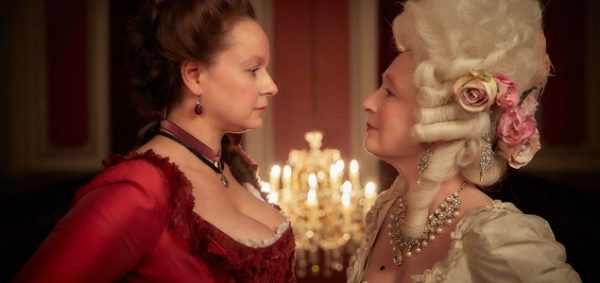
On reformists of the time, societal reception, and legal consequences:
Kitty: Many sex workers weren’t arrested for sex work (which had never been made illegal before at this point, though as Red mentioned, keeping “disorderly houses” was), but rather for being drunk and rowdy, or shouting obscenities. Prostitution was seen as something men required access to, and while the women who did it were considered “fallen,” their “sacrifice” was needed to protect chaste women from the desires of men.
Sex workers also were mostly not seen as victims in need of saving, rather, they were considered corrupt criminals. This began to shift with the creation in 1758 of the Magdalen Hospital for the Reception of Penitent Prostitutes, a place for prostitutes under 30 who were serious about changing their lifestyle could come, be trained in other practical skills, go to church twice a day, and get a small allowance while having food and board. Interestingly, the hospital was not created initially by the Church, but by some merchants. Once the Church took over Magdalen hospitals/asylums/laundries, they began to resemble involuntary workhouses instead of a voluntary charity for sex workers to seek out or not.
Red: These Magdalen hospitals, which taught whores a trade (generally needlework or domestic service) so that women could leave prostitution, but they too used these women’s bodies in order to solicit funding: wealthy people could pay to tour the hospitals and watch the fallen women be reformed.
Women could leave the Magdalen hospitals prepped with those trades and still find they didn’t have enough to survive, which is another thing that makes the show’s depiction of Lucy and Charlotte look so bitterly and hilariously ungrateful.
On class, in the show and in the 18th century:
Red: Interestingly, until the early 19th century, the biggest persistent danger whores faced was from apprentices, who regularly (like at least once a year) ran riot and assaulted brothels and sex workers, and had since at least the 12th century or so. In medieval France and Italy, apprentice gang rapes and gang rapes by groups of other young men on women of all types were incredibly common, for reasons historians only guess at (misogyny, lack of independence—these were usually unmarried men and apprentices) and it gradually dwindled to attacks on sex workers as an easier and more viable target. Apprentice riots were always dangerous, but by the 18th century they were largely focused on the elitism of whore houses, which is sickly hilarious and reminds me of the club customer who asked me if I didn’t think it was elitist to tell him to go home and come back when he had money to tip.
The show isn’t featuring pristine Pemberley-style backdrops and is solidly focused on the lower classes. It might be one of the few shows I can think of that seem to be focusing on poverty and the violence of poverty, and how close it is for all but a very few of us, and the grimy driving fear of it.
Kitty: Keep in mind, too, that poverty was seen as more of a social ill than prostitution—there was very much a meritocratic, bootstrapping ideal in the Georgian era, where if you were poor it was likely because you were lazy and probably drinking or gambling too much. Being a prostitute, at least, meant you were trying to better your financial situation and not rely on charity. Attitudes about those receiving charity were sadly similar to many people’s views on welfare recipients today.
Respectability politics have always been at least in part about avoidance of consequences—from the law, and from religious zealots. I like that they show this here through Lady Quigly’s upper-crust brothel with its refined workers speaking French and her sway with local law enforcement, because that certainly hasn’t changed. Similarly, it hasn’t changed that the people who warrant the most hand-wringing now are white students entering sex work, just as white country girls entering sex work in Georgian England were seen then as the ones in need of rescue.
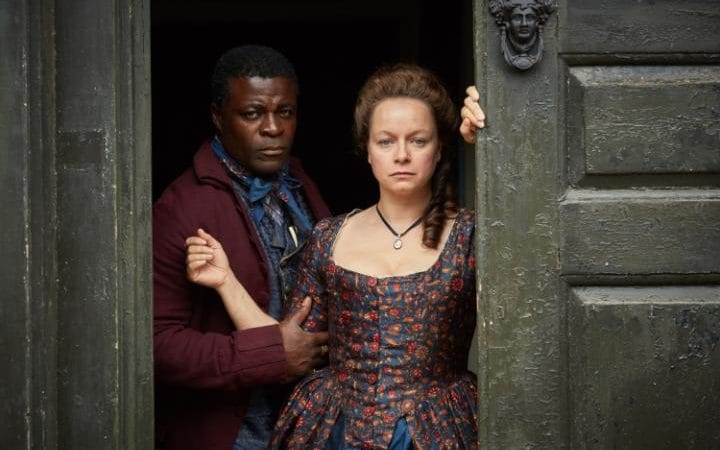
Short video on the sexworkernation YouTube channel regarding the show Harlots:
Using Harlots algorithms to push our narrative.
https://youtu.be/tQjU3_DTfIE